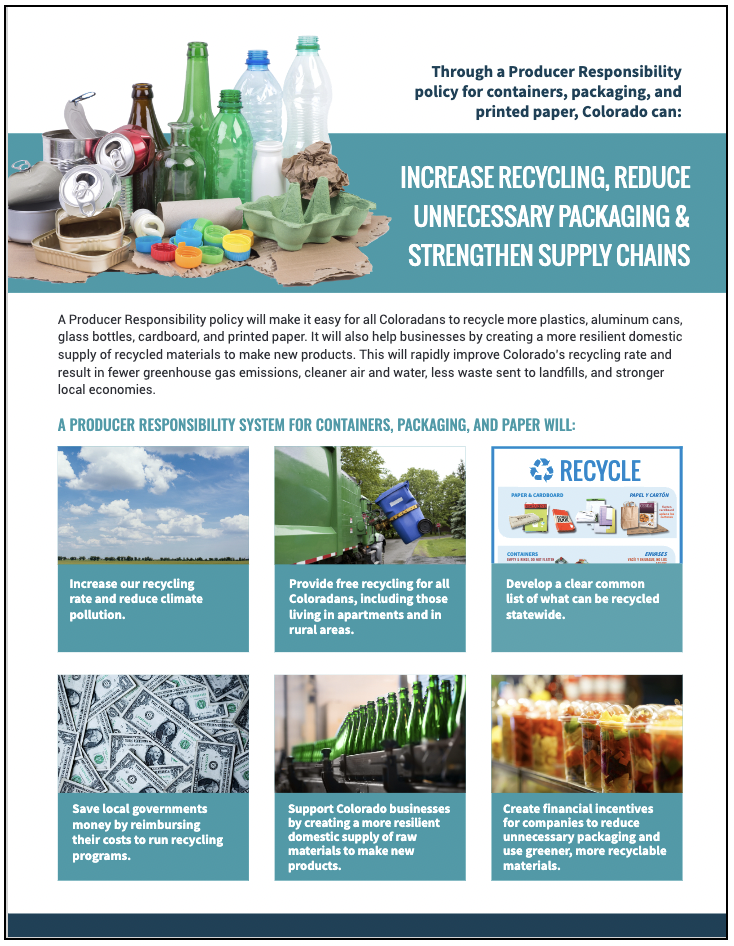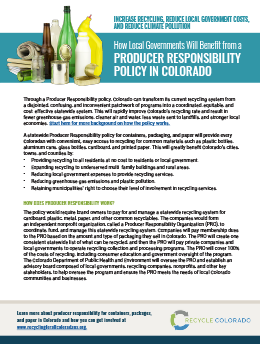What is Producer Responsibility?
Producer Responsibility (sometimes called Extended Producer Responsibility or EPR) is a critical policy mechanism to help advance a Zero Waste future and a circular economy. Producer Responsibility shifts responsibility for the post-consumer management of products and packaging from local governments to producers. This includes financial responsibility and sometimes day-to-day management of covered material. Across the US, states are turning toward Producer Responsibility policies to fundamentally revamp and reinvest in our recycling systems to build a more efficient, financially sustainable system.
Since product manufacturers and brand owners control how a product is designed and manufactured, they have the most direct influence on whether their products and packaging can be recycled. Yet in most cases, producers have no stake in the success of recycling programs. Recycling programs are managed and financed primarily at the local level, either funded by taxpayers or by user fees on households. However, local governments cannot control how products are made or how easy they are to recycle, and are faced with ever-increasing expenses to manage these materials.
By transferring the costs of recycling to the product manufacturers, Producer Responsibility policies can help:
- provide more convenient recycling programs for residents
- improve recycling rates, reduce carbon emissions and reduce plastic pollution
- drive more environmentally sustainable products and packaging
- reduce costs to local governments.
Successful Producer Responsibility Models for Hard-to-Recycle Materials and Packaging
Producer Responsibility policies have been in place in Europe since the early 1990s and have now spread to every continent. These policies typically cover two distinct material types: hard-to-recycle materials and packaging.
In the US, there are currently 130 Producer Responsibility policies across 33 states, a tremendous increase from fewer than 10 policies in 2001. These policies target 16 different types of products, focusing on bulky or hard-to-recycle materials such as electronics, paint, mattresses, carpet, fluorescent lighting, and pharmaceuticals.
Producer Responsibility programs for packaging and paper products (PPP) are common in Canada and the EU where Producer Responsibility policies have been highly successful at increasing the recycling of packaging. In Europe, where Producer Responsibility has been established for decades, many countries have PPP recycling rates above 70% or 80%. By contrast, the US recycles only 50% of PPP materials and as little as 8% of plastics. In 2021, the states of Maine and Oregon became the first two US states to adopt Producer Responsibility laws for packaging. In 2022, Colorado became the third!
Producer Responsibility in Colorado
Producer Responsibility is a proven approach in Colorado.
Colorado implemented a Producer Responsibility program for paint in 2015 that has successfully increased paint recycling rates, provided greater access to collection sites, and reduced costs to cities and counties that previously paid for this service. Nearly 95% of residents now have access to paint recycling within 15 miles. Learn more about how the program works.
Producer Responsibility for containers and packaging in Colorado will be essential to improve the state’s recycling rate.
Colorado’s recycling rate was a dismal 16% in 2021, half the national average and well below our goal. Increasing our recycling rate will reduce climate pollution, protect our clean air and water, and create jobs. Yet the investment needed to expand and improve our recycling system cannot and should not be the sole responsibility of local or state government or waste haulers. Consumer goods companies need to help finance recycling infrastructure, operations, and education programs to increase the recycling of their products and packaging.
Colorado’s new Producer Responsibility policy for containers, packaging, and paper products provides the opportunity to create an efficient, financially sustainable collection system for curbside recyclable materials such as plastic bottles, aluminum cans, glass bottles, cardboard, and printed paper.
Under Producer Responsibility for containers, packaging, and printed paper, Colorado will:
- Increase our recycling rate and reduce climate pollution,
- Provide all residents statewide with convenient access to recycling in both urban and rural areas,
- Eliminate the additional fee that residents currently pay for curbside recycling,
- Expand equitable access to recycling for multifamily properties like apartment buildings,
- Develop a clear common list of what can be recycled statewide, and
- Boost our local economies by supporting businesses that use our recycled materials to make new products right here in Colorado.
Oregon and Maine adopted the first Producer Responsibility policies in the US for packaging and containers in 2021 and several states are moving forward with proposals in 2022. Product manufacturers are increasingly interested in paying for recycling systems in order to meet their recycling and sustainability goals. Over 150 global companies and leading organizations support Producer Responsibility policies as the only proven and likely mechanism to provide sufficient, ongoing, and dedicated funding to increase recycling and reduce plastic pollution.
Learn More
Check out these resources to learn more about Producer Responsibility for packaging:
- Colorado’s Producer Responsibility campaign website: recyclingforallcoloradans.org
- Eco-Cycle handout on benefits of Producer Responsibility for packaging in Colorado
- Product Stewardship Institute: Producer Responsibility for packaging webpage (check out their report and toolkit too!)
- State of Washington report, Extended Producer Responsibility Policy Framework and Implementation Model: Residential Recycling of Packaging and Paper Products in Washington State
- State of Oregon report, Extended Producer Responsibility for Packaging and Paper Products: Policies, Practices, and Performance



























